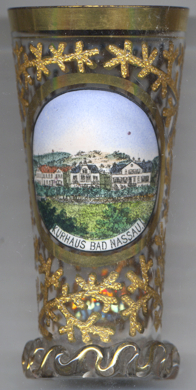

|
| DEUTSCHLAND | GERMANY |
| Bundesland: Rheinland-Pfalz | Rhineland-Palatinate |
| Landkreis: Rhein-Lahn-Kreis |
 Nassau is situated at an elevation of 100 m on the river Lahn, about 7 km southeast of Bad Ems, the
administrative seat of the district Rhein-Lahn-Kreis, about 16 km southeast of Koblenz, and about 48 km
northwest of Mainz, the capital of Germany's state of Rheinland-Pfalz. The municipality has a population of about
4,700 (2022).
Nassau is situated at an elevation of 100 m on the river Lahn, about 7 km southeast of Bad Ems, the
administrative seat of the district Rhein-Lahn-Kreis, about 16 km southeast of Koblenz, and about 48 km
northwest of Mainz, the capital of Germany's state of Rheinland-Pfalz. The municipality has a population of about
4,700 (2022).
The earliest known written mention of Villa Nassova, an estate of the bishop of Worms, dates from AD 915.
The privileges as a town were granted in 1348. Nassau Castle was founded about 1100 by the counts of Laurenburg and the descendants began to call
themselves Counts of Nassau. Count Adolf of Nassau served as the elected King of the Romans from 1292 until his death in 1298.
After the dissolution of the Holy Roman Empire in 1806, the town became part of the Duchy of Nassau. After the dissolution of the Holy Roman Empire
in 1806, the town became part of the Duchy of Nassau (with its capital at first at Weilburg and from 1816 and in Wiesbaden),
and in 1868 part of the Prussian provinve of Hesse-Nassau. The town is the namesake of the royal House of Nassau and its branch named the House of
Orange-Nassau. The Grand Dukes of Luxembourg still use Nassau as a title and it is also part of
the Dutch royal family (called Oranje-Nassau). Its name has also spawned a multitude of other namings in the Americas, such as Nassau, the capital
city of the Bahamas, and Nassau
The  Kuranstalt (spa) Bad Nassau [left, no. 4617] was founded by the physician Emil Haupt in 1856
as an 'Institute for Electricity, Therapeutic Gymnastics, Pine Needle and Cold Water Baths'.
Kuranstalt (spa) Bad Nassau [left, no. 4617] was founded by the physician Emil Haupt in 1856
as an 'Institute for Electricity, Therapeutic Gymnastics, Pine Needle and Cold Water Baths'.
Nassau is also the name of municipal districts of Frauenstein and of Meißen in
Germany's state of Saxony.
[https://de.wikipedia.org/wiki/Nassau_(Lahn), https://en.wikipedia.org/wiki/Nassau,_Rhineland-Palatinate;
https://de.wikipedia.org/wiki/Emil_Haupt]
![[scale]](lineal.jpg)